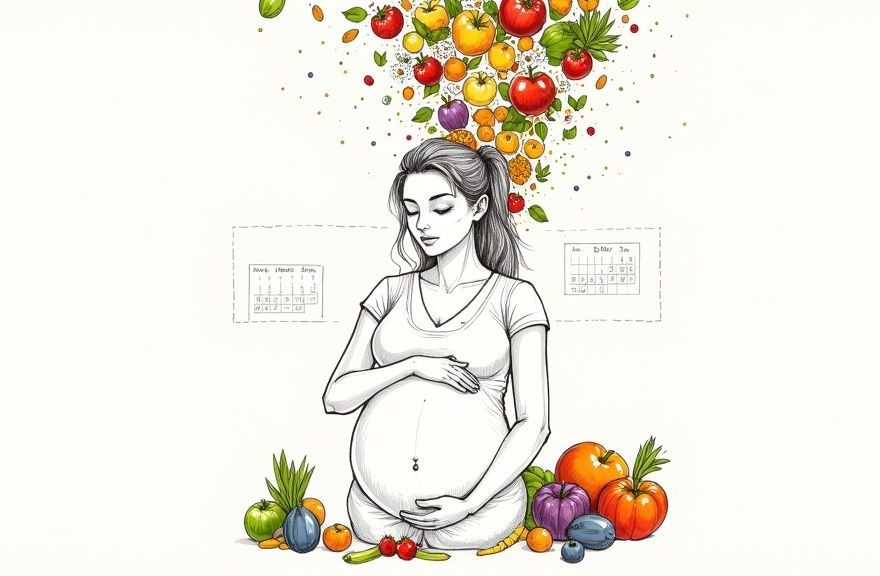Understanding Your Pregnancy Nutrition Needs
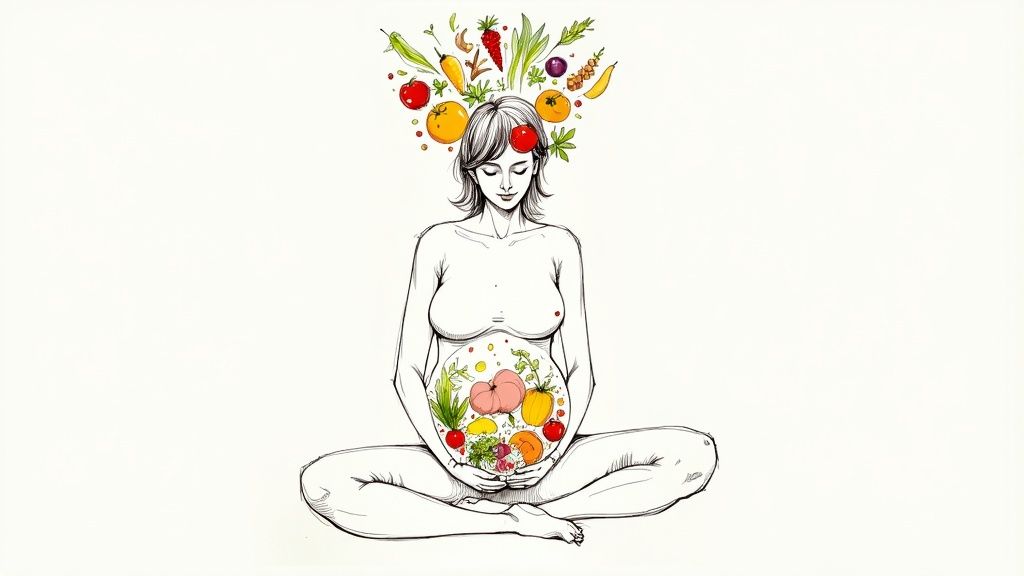
Growing a baby changes how your body uses nutrients. This guide breaks down what you need to know about eating well during pregnancy, with practical tips based on the latest research to help you and your baby thrive.
How Many Extra Calories Do You Need?
Your calorie needs change throughout pregnancy, but not as dramatically as you might think. By the second trimester, you’ll need about 340 extra calories each day – that’s roughly the amount in a peanut butter sandwich and a glass of milk. This increases to 450 extra calories in the third trimester. For example, if you ate 2,000 calories before pregnancy, aim for 2,340 in the second trimester and 2,450 in the third. These modest increases support your baby’s growth and development, helping form everything from tiny organs to strong bones.
Smart Ways to Add Those Extra Calories
Adding calories doesn’t mean reaching for cookies and chips. Focus on foods that pack both calories and nutrients into each bite. Try adding sliced almonds to your morning oatmeal, having an apple with cheese as an afternoon snack, or including an extra scoop of quinoa with dinner. These small additions add up while giving your body the fuel it needs.
Dealing with Changing Appetite
Some days you might feel starving, while others you barely want to look at food – and that’s completely normal during pregnancy. The key is working with these changes rather than fighting them. If morning sickness hits, try eating small meals every few hours. When hunger strikes, keep healthy snacks handy like cut-up vegetables, whole grain crackers, or fresh fruit to avoid grabbing whatever’s closest when hunger hits.
Simple Ways to Track Your Eating
While it’s good to pay attention to what you eat during pregnancy, there’s no need to count every calorie or track every bite. Writing down what you eat for a few days each week can help you spot any gaps in your diet without becoming overwhelming. Many pregnancy apps can help track nutrients, but use them as rough guides rather than strict rules. The goal is to develop good eating habits that nourish you and your baby while keeping stress levels low. This balanced approach helps create a foundation for a healthy pregnancy.
Building Your Pregnancy Nutrient Foundation
Good nutrition during pregnancy involves much more than just taking prenatal vitamins. While supplements provide important backup, knowing exactly how different nutrients support your baby’s growth helps you make better food choices. Understanding these basics allows you to take an active role in giving your baby the best possible start.
Key Nutrients and Their Roles
During pregnancy, your body needs higher amounts of several essential nutrients. You’ll need about 50% more iron (27mg daily vs the usual 18mg) to support your increased blood volume and deliver oxygen to your baby. Folate becomes especially important in early pregnancy – aim for 600 micrograms daily to help prevent birth defects as your baby’s neural tube develops.
Your baby also needs plenty of calcium and protein to grow strong bones, muscles, and organs. Think of calcium as providing the framework for your baby’s skeleton, while protein supplies the building blocks for healthy tissue growth. Getting enough of all these nutrients through food helps ensure your baby develops properly.
Practical Tips for Meeting Your Nutrient Needs
Making small changes to your diet can help you get the extra nutrients you need. For example, eating iron-rich foods like lean beef along with vitamin C sources like red peppers helps your body absorb more iron. Including dairy products and dark leafy greens in your meals provides the calcium your baby needs for bone development.
| Nutrient | Key Role | Food Sources |
|---|---|---|
| Iron | Red blood cell production | Lean red meat, poultry, beans, fortified cereals |
| Folate | Prevents neural tube defects | Leafy greens, citrus fruits, fortified grains |
| Calcium | Bone development | Dairy products, leafy greens, fortified foods |
| Protein | Muscle and tissue development | Lean meats, poultry, fish, beans, lentils, eggs |
Of course, morning sickness can make it hard to eat well. If nausea is an issue, try eating smaller amounts more often throughout the day. Simple foods like crackers or toast may be easier to keep down and help maintain your energy.
Supplements and When They Matter
While getting nutrients from food is ideal, supplements can help fill in any gaps, especially if you have morning sickness or follow a restricted diet. Your doctor can recommend specific supplements based on your needs – for instance, many pregnant women need extra iron to prevent anemia.
By understanding these key nutrients and making informed food choices, you’re giving your baby important building blocks for healthy development. Focus on eating a variety of nutrient-rich foods and work with your doctor to determine if you need additional supplement support.
Mastering Pregnancy Weight Management
Managing weight during pregnancy isn’t about strict dieting – it’s about making smart food choices that nourish both you and your baby. Let’s explore how to approach pregnancy weight gain in a balanced, healthy way that supports your baby’s development while helping you feel your best.
Understanding Healthy Weight Gain Ranges
Your pre-pregnancy Body Mass Index (BMI) helps determine how much weight you should gain during pregnancy. For women who start pregnancy at a normal BMI (18.5-24.9), doctors typically recommend gaining 25-35 pounds total. This usually means adding about 0.8 to 1 pound per week in the second and third trimesters. Every pregnancy is different though – women who start underweight may need to gain more, while those who are overweight may need to gain less. Your doctor can help create a personalized plan based on your specific needs.
Nourishing Yourself, Not Just “Eating for Two”
While you are eating to support two, focus on food quality rather than just eating more. Think of your diet like building your baby’s first home – you want to use the best materials possible. Choose foods packed with nutrients that help your baby grow: plenty of colorful fruits and vegetables, whole grain breads and cereals, lean proteins like chicken and fish, and healthy fats from foods like avocados and nuts. These choices give your baby what they need while helping you maintain healthy weight gain.
Managing Cravings and Staying on Track
Those pregnancy cravings can be intense! While it’s fine to give in sometimes, try to make healthy swaps most of the time. For example, when sugar cravings hit, grab a sweet orange or bowl of yogurt with berries instead of cookies. If you’re craving something salty, try air-popped popcorn or a small handful of almonds rather than potato chips. Simple switches like these let you satisfy cravings without getting off track with your nutrition goals.
Body Image and a Realistic Approach
It’s normal for your changing body to bring up mixed feelings during pregnancy. Remember that gaining weight is not just normal – it’s necessary for your baby’s health. Instead of comparing yourself to others, focus on taking good care of yourself and your growing baby. If you’re struggling with body image, don’t hesitate to talk with your doctor or a registered dietitian. They can help you develop a positive mindset and practical strategies for healthy eating, like managing the recommended extra calories (about 340 more in the second trimester and 450 more in the third) without stress. The key is finding balance – nourishing your baby while being kind to yourself during this amazing journey.
Creating Your Pregnancy Meal Plan Blueprint
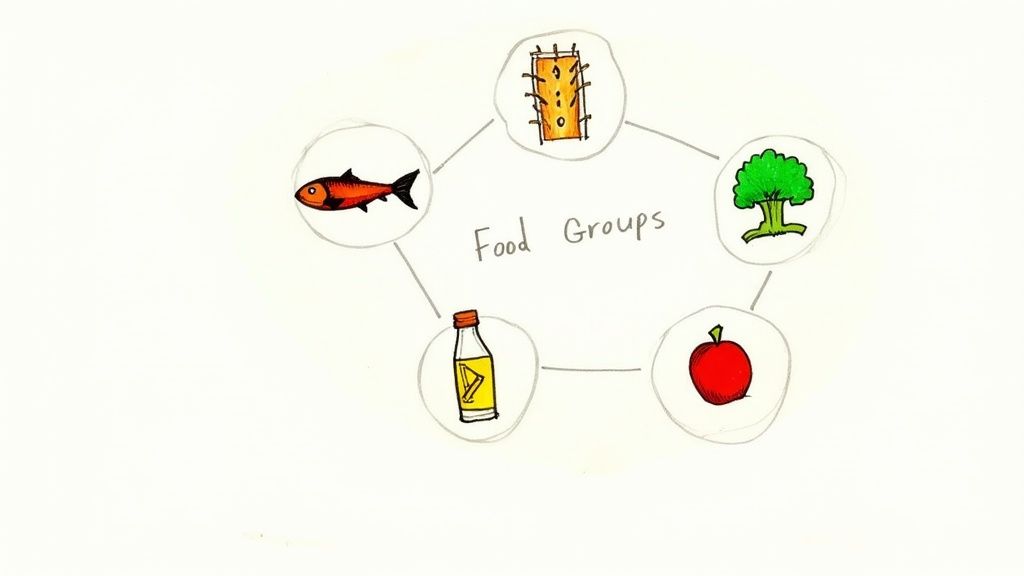
Planning healthy meals during pregnancy goes beyond just knowing which nutrients you need. The key is developing practical meal plans that work with your daily routine while ensuring both you and your baby get proper nourishment. Let’s break down how to turn basic nutrition guidelines into delicious, easy meals that support a healthy pregnancy.
Building Balanced Plates for Two
Think of your plate as a simple guide for getting the right mix of nutrients at each meal. Fill half your plate with colorful fruits and vegetables – things like fresh spinach, crunchy bell peppers, and sweet berries give you important vitamins and minerals. Split the other half between protein-rich foods and whole grains. Good protein choices include chicken breast, fish, beans, or lentils, which help your baby develop properly. For grains, try brown rice, quinoa, or whole wheat bread to keep your energy steady. Keep in mind that you’ll need about 340 extra calories in your second trimester and 450 more in your third trimester. Instead of eating much larger portions, focus on adding nutrient-dense foods to your meals.
Time-Saving Meal Prep Strategies
When you’re expecting, having quick and easy meal options is essential. Setting aside time on weekends for basic prep can make weeknight cooking much easier. Try roasting a chicken on Sunday to use in different meals throughout the week. Wash and chop vegetables ahead of time, pack individual snack portions, and freeze smoothie ingredients in bags. These simple steps mean you can throw together healthy meals even when you’re tired or short on time.
Overcoming Pregnancy Food Aversions
It’s common for pregnancy to change how certain foods taste or smell to you. While these food aversions can be frustrating, you can still maintain good nutrition with some creative switches. If red meat suddenly turns you off, try getting iron from other sources like dark beans, lentils, or fortified breakfast cereals. Sometimes changing how you cook something – like steaming instead of frying – can make it more appealing. Don’t hesitate to reach out to your doctor or a registered dietitian if food aversions are making it hard to eat well. They can help you find alternatives that work for you.
Flexible Meal Templates and Shopping Strategies
Make meal planning simpler by using basic templates you can adapt. For example, start with picking one protein, one whole grain, and two vegetables for each main meal. This gives you structure while letting you swap ingredients based on what you like and what’s available. When shopping, make a list based on your meal templates and stick to it. Consider using grocery delivery or pickup services to save energy and avoid impulse purchases. This organized approach helps ensure you’re getting the nutrition you need while keeping meal planning manageable throughout your pregnancy.
Preventing Common Pregnancy Nutrient Gaps
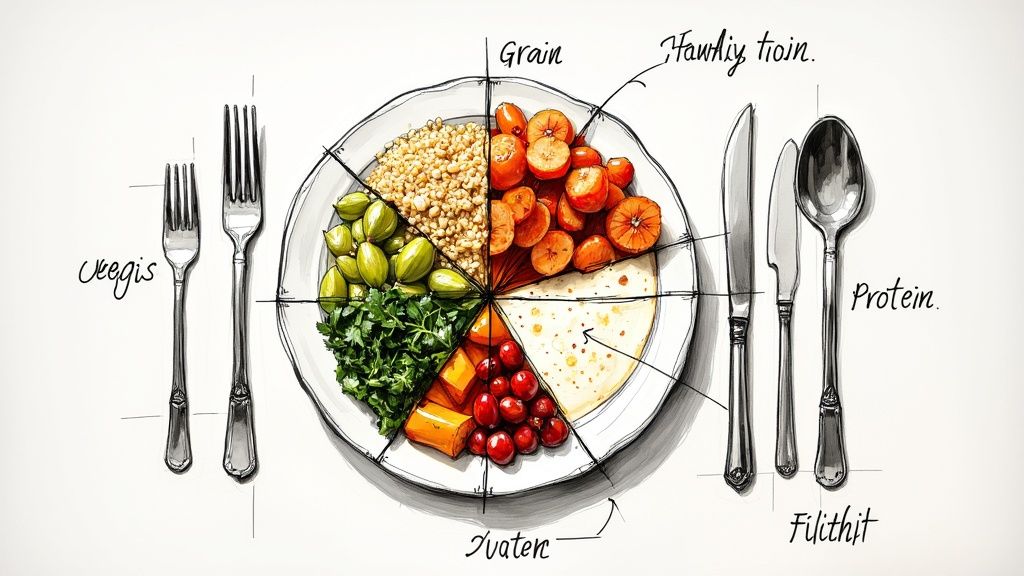
Getting the right nutrients during pregnancy can be confusing with so much information to sort through. Understanding how to spot and prevent common nutritional gaps is key for keeping both you and your baby healthy throughout pregnancy. Here’s a practical guide to help you identify potential deficiencies and take action early.
Recognizing the Signs of Nutrient Deficiency
Your body often gives subtle hints when it needs more of certain nutrients. If you’re feeling extremely tired even after getting enough sleep, this could point to low iron levels. Other signs of iron deficiency include pale skin, getting winded easily, and noticeable heart palpitations. This is especially important since pregnant women need to increase their daily iron intake from 18mg to 27mg.
But iron isn’t the only nutrient to keep an eye on. Changes in your nails like brittleness or unusual ridges might mean you need more biotin or other B vitamins. Frequent muscle cramps could signal that you’re low on magnesium or potassium. Pay attention to these physical signs and bring them up with your doctor – catching deficiencies early makes them much easier to address.
Practical Solutions for Maintaining Adequate Iron Levels
Since iron is crucial for supporting your increased blood volume during pregnancy, focus on including iron-rich foods in your daily meals. Good sources include lean red meat, chicken, and fish. If you follow a plant-based diet, load up on beans, lentils, and iron-fortified cereals instead.
Here’s a helpful tip: pair iron-rich foods with those high in vitamin C to boost absorption. For instance, add orange slices to your chicken sandwich or squeeze fresh lemon juice over your lentil soup. These simple food combinations help your body get the most iron possible from your meals.
The Role of Supplementation in Pregnancy Nutrition
While eating a balanced diet should be your main focus, supplements can help fill in any nutritional gaps, especially when morning sickness or food aversions make eating difficult. Most prenatal vitamins contain essential nutrients like iron and folate, but your doctor might suggest additional supplements based on your specific needs and blood work results.
For example, if severe morning sickness makes it hard to eat properly, supplements can ensure you’re still getting vital nutrients. Always check with your healthcare provider before starting any new supplement, particularly iron supplements since they sometimes cause constipation. Your doctor can help manage side effects by suggesting more fiber in your diet. By combining thoughtful food choices with appropriate supplements, you’ll build a strong nutritional foundation for your pregnancy journey.
Securing Your Baby’s Future Health Through Nutrition
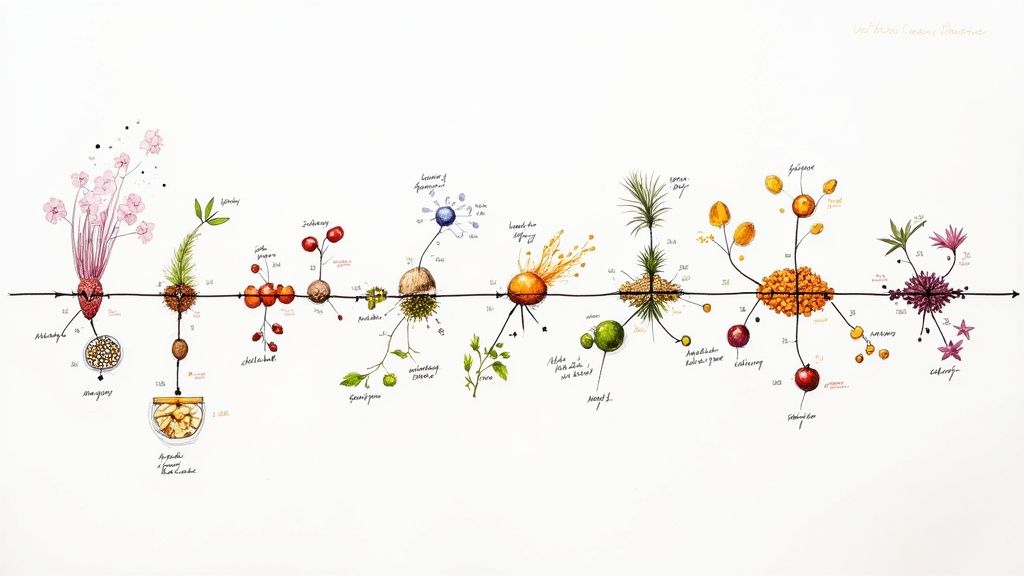
What you eat during pregnancy directly shapes your baby’s health, both now and in the future. The nutrients you provide through your diet help form the building blocks of your baby’s development. Getting the right nutrition is one of the most important things you can do as an expecting mother to give your child the best start in life.
The Science Behind Fetal Programming
Your baby’s growth in the womb sets the stage for their lifelong health. Research shows that a mother’s diet during pregnancy can influence everything from their child’s weight to their risk of certain health conditions. For example, women who eat mostly processed foods during pregnancy may have children with higher rates of obesity and metabolism issues. On the flip side, getting enough key nutrients like folate helps prevent birth defects and supports healthy development. That’s why having good nutrition guidance during pregnancy is so valuable – it helps you make choices that benefit your baby for years to come.
Optimizing Nutrition for Lasting Benefits
The best pregnancy diet focuses on real, whole foods packed with vitamins and minerals. Fill your plate with colorful fruits and vegetables, lean proteins like chicken and fish, whole grains, and healthy fats from foods like avocados and nuts. But good nutrition isn’t just about food choices – it’s also about eating habits. Having regular meals throughout the day keeps your blood sugar steady, which helps your baby grow. Think of it like keeping a steady supply of premium fuel in your car – your body (and baby) run best when you provide consistent, high-quality nutrition.
Implementing Healthy Habits Post-Pregnancy
The benefits of eating well continue long after your baby arrives. Good nutrition helps you recover from childbirth and keeps you energized for those early days of motherhood. If you’re breastfeeding, you’ll need extra nutrients to produce healthy milk for your baby. Plus, the eating habits you establish now will influence how your whole family approaches food. When you model healthy choices, you help your child develop a positive relationship with nutrition from their earliest days.
We understand that pregnancy brings many questions and changes. That’s why Pregnancy 101 offers expert guidance specially designed for Indian moms-to-be. Our live sessions cover everything from prenatal nutrition to postnatal care, including traditional practices like Garbh Sanskar. Join our community of over 5,000 mothers who have found support and confidence through our programs. Visit our website to learn how we can support you on your journey to motherhood.

